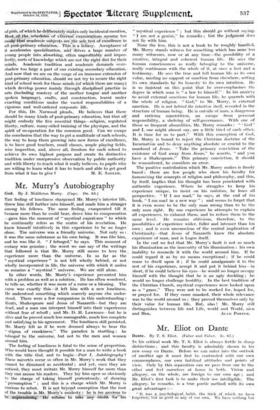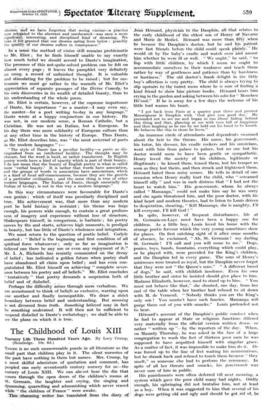Mr. Eliot on Dante
Dante. By T. S. Eliot. (Faber and Faber. 3s. 6d.)
IN his critical work Mr. T. S. Eliot is always fertile in sharp distinctions ; and this' faculty is admirably shown in his new essay on Dante. Before we can enter into the outlook of another age it must first be contrasted with our own commonplaces, our own habitual attitudes and points of view. Only by this ieparation can we pass from one to the other and feel ourselves at home in both. Vision and allegory, on the whole, are foreign to our own age ; and Mr. Eliot's first task is to make their "Use intelligible._ The allegory, he remarks, is a true poetic method with its own great advantages " It, was a psychological habit, the, trick of ,which. we have forgbiteiOni‘ as itcod as any of our own. We have nothing but dreams, 'and we have forgotten that seeing visions—a practice now relegated to the aberrant and uneducated—was once a more siiniffetiiit; :interesting, and disciplined kind of dreaming. We take it f(Fr:-granted that our dreams spring from -possibly the qualit37, '0 our dreams suffers in consequence." _ In" a :sense:: the method of vision still remains problematic to Mr. Eliot ; for he finds hinieelf Unable to say exactly how much belief we should accord to Dante's itriagination, The presence of this not-quite-solved problem can be felt on almost every page ; it leaves the pamphlet very definitely an essay, a record of unfinished thought. It is valuable and stimulating for the problem to be raised; but for sus- tenance we must go:r rather to the „warmth of Mr: Elibt's appreciation of separate passages of the Divine CoMedyi to his Own discoveries in its wealth of detailed beauty, than to his understanding of the whole poem.
Mr. Eliot is certain, however, of the supreme importance of Dante, his importance " as a master—I may even say, the master—for a poet .writing to-day in any language." Dante wrote at a happy conjuncture in our history. He was not, in our modern sense, a Roman Catholic, but a Christian. He was not an Italian, but a European. In his day there was more solidarity of European culture than at any other time in the history of Europe. Thus. Dante, ds Mr. Eliot describes him, was " the'mcist universal of poets in the modern languages " :— " The style of Dante has a peculiar lucidity—a poetic as dis- tinguished from an intellectual lucidity. The thought may be obscure, but the word is lucid, or rather. translucent. In English poetry words have a kind of opacity which is part of their beauty. I do not mean that the beauty of English poetry is what is called mere ' verbal beauty.' It is rather that words have association, and the groups of words in association have associations, which is' a kind of local self-Consciousness, because they are the growth of a particular civilization ; and the same thing is true of other modern languages. The Italian of Dante, though essentially the Italian_ -of to-day, is net in this way a Modern language."
In this way circumstances were favourable for Dante's own geiiitis; which of itself was' peculiarly disciplined and true. His .achieyement was, that more than any modern poet he held fairdasy in restraint ; his theme was large enough, his powers wide enough, to contain a great profuse- ness of imagery and- experience without loss of structure. Shakespeare himself, in comparison, is berhitrie; his poetry Moves by fits and starts, achieves high moments, is prodigal in beauty, but has little of Dante's, wholeness and integration.
We must return to the question of poetic belief. Carlyle asserted : " Belief is the beginning and first condition of all spiritual force whatsoever ; only so far as imagination is believed can there be any use or even any enjoyment of it.", Mr. I. /V.. Richards has recently commented on the decay of belief ; has indicated a golden future when poetry shall have abandoned all claim upon belief ; and has even con- gratulated Mr. Eliot himself on achieving " complete sever- ance between his poetry and all beliefs." Mr. Eliot concludes " tentatively " that poetry demands a suspension both of belief and of. disbelief.
Perhaps the difficulty arises through mere verbalism. We are accustomed to think of beliefs as exclusive, warring upon one another and finally incompatible. We draw a strict boundary between belief and understanding. But meaning is not divorced from truth. Something believed may in fact be something understood. It will then not be sufficient to suspend disbelief in Dante's eschatology ; we shall be able to see the plane on which it is true.























































 Previous page
Previous page